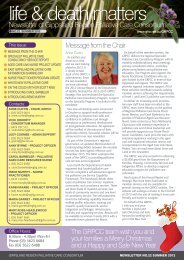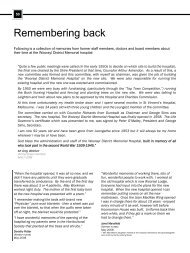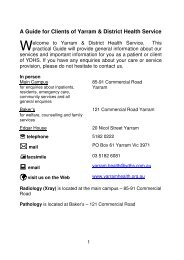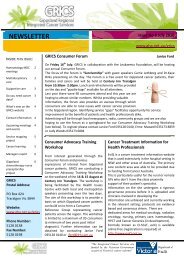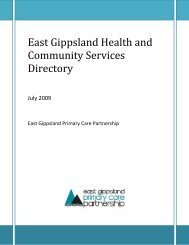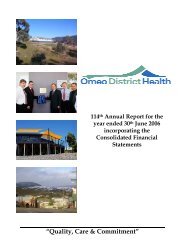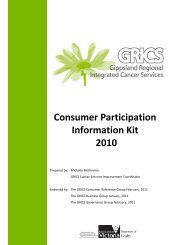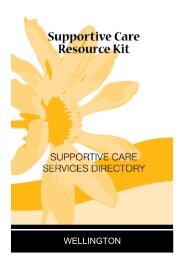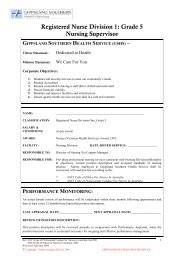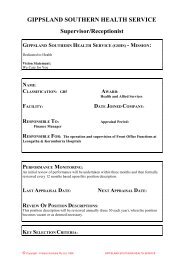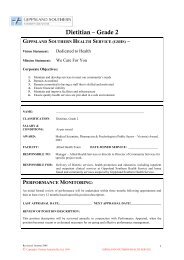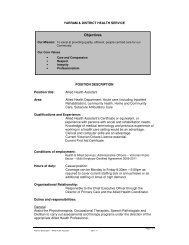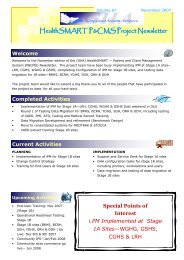HOSPITAL PATIENTS GUIDE
HOSPITAL PATIENTS GUIDE
HOSPITAL PATIENTS GUIDE
Create successful ePaper yourself
Turn your PDF publications into a flip-book with our unique Google optimized e-Paper software.
PATIENT INFORMATION<br />
Minimal fees may apply to some community<br />
based services.<br />
For further information, contact Bass Coast<br />
Regional Health during office hours on:<br />
Telephone: (03) 5671 3333<br />
Facsimile: (03) 5671 3300<br />
Falls Prevention<br />
Falls prevention is a key concern at Bass Coast<br />
Regional Health, and the aim is to maintain your<br />
safety, independence, and confidence.<br />
All patients are given a comprehensive<br />
assessment on admission, and falls risks are a<br />
part of this process. Strategies specific to your<br />
requirements are then integrated into your plan<br />
of care to minimise the risk of a fall.<br />
Your risk of falls is often high on admission, due<br />
to a combination of your current condition and<br />
the change in environment. Fortunately there<br />
are simple steps that you, your carer/ family/<br />
friends, and the staff can take to prevent the<br />
likelihood of a fall.<br />
One of the visible strategies used at Bass Coast<br />
Regional Health is the colour orange. Orange<br />
wrist bands and an orange ‘ falling star’ symbol<br />
in a bed area are sometimes used to assist staff in<br />
the need to keep patient areas clear, or to offer<br />
that little bit extra support when ambulating.<br />
Factors influencing the risk of falls are:<br />
• Nutrition<br />
• Mobility (prior falls, general health, and<br />
physical condition)<br />
• Continence<br />
• Cognition<br />
- Depression<br />
- Delirium<br />
- Dementia<br />
• Environment (particularly a change in<br />
environment)<br />
• Medications<br />
Things for you to consider:<br />
• Keep the space around your bed free of<br />
unnecessary clutter as this can be a tripping<br />
hazard.<br />
• If you have been prescribed a walking aid or<br />
other aid to assist in you independence, use<br />
them as these are for your safety.<br />
Inform staff if you previously relied on walking<br />
aids or specialised equipment such as chairs or<br />
showering aids.<br />
• When you first arrive, or post a procedure you<br />
may be unsteady on your feet. Ask for<br />
supervision until you are safer, or it may be<br />
necessary to use a walking aid.<br />
• If rushing to the toilet is a problem, let the<br />
staff know so a toilet regimen or other<br />
strategies can be established.<br />
• Tell the staff if you think existing or new<br />
medications are causing side effects,<br />
particularly dizziness, or unsteadiness on your<br />
feet. Report any episodes of dizziness that<br />
may occur.<br />
• Take the opportunity for supervised physical<br />
activity while on the ward as this helps with<br />
gradual improvement in strength and<br />
balance.<br />
• Ensure that you or your family bring in<br />
appropriate fitting slippers/shoes as they are<br />
essential for safe walking.<br />
16



